When Donald Trump unveiled his White House American Manufacturing Council in January, it had 28 members, each of whom were prominent business or labor leaders. In June, Tesla's Elon Musk resigned from the panel after the president abandoned the Paris climate accords, and yesterday, it shrunk a bit more.
Ken Frazier, the CEO of Merck, got the ball rolling yesterday morning, announcing that he'd stepped down from Trump's council, following the president's reaction to white-supremacist violence in Charlottesville. True to form, Trump responded by lashing out at Frazier -- twice.
Nevertheless, by last night, Frazier had some company. The New York Times reported:
Brian Krzanich, C.E.O. of Intel -- one of the most important global manufacturers of computer chips -- announced his departure from President Trump's advisory council on manufacturing in a late-night blog post on Monday.The decision followed similar moves from Kenneth C. Frazier, the chief executive of drugmaker Merck, who was the first executive to leave the advisory group on Monday, and Kevin Plank, the founder and chief executive of athletic apparel maker Under Armour, who also announced his decision on Monday evening.Taken together, the executives' decisions are the business community's strongest rebuke to date of a president who has courted controversy for his entire career.
Other members of the American Manufacturing Council -- and other White House panels featuring plenty of other private-sector chiefs -- have plenty of reasons to do the same thing.
What incentive would a CEO have for maintaining a formal, cooperative role with this president? Why risk being tarnished by his scandals and antics? In theory, the insider access has value, but these councils and commissions are largely honorary anyway. It's not as if the White House encourages them to help shape policy.
For some, fear keeps them from fleeing, even in the wake of a racially charged controversy. A separate New York Times report added, "Privately, many chief executives say they are fuming, outraged by the president.... But many are too scared to say anything publicly that could make them or their company a target of Mr. Trump's wrath."
Realistically, though, the unpopular president's wrath isn't especially scary. Trump complained bitterly about Merck, but the pharmaceutical giant nevertheless saw its stock reach a two-month high yesterday. Investors didn't seem to care about the president's dissatisfaction.
For business leaders who are invited to serve on official White House committees, it's clear that there's little upside to accepting: the association with Trump is fraught with risks, and there's little upside. For business leaders who are already serving on these panels, the smart move is to run in the opposite direction as quickly as possible.
